#Andrew Goldman
Explore tagged Tumblr posts
Text
havent posted in eons. soooo art dump ^_^





#marilyn manson#antichrist superstar#ville valo#him band#his infernal majesty#nonpoint#andrew goldman#elias soriano#robb rivera#ken macmillan#vengeance#staind#aaron lewis#2000s#90s#nu metal#numetal#art#fanart#korn#slipknot#limp bizkit#linkin park#kittie band#evanescence#metal#industrial metal#90s metal#2000s metal#Spotify
32 notes
·
View notes
Text
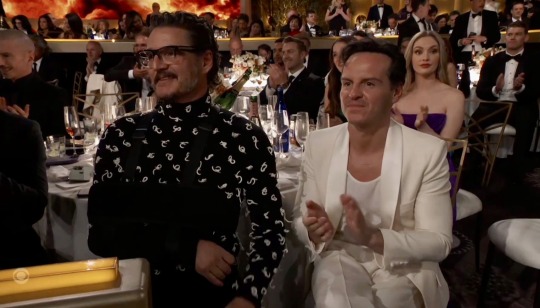
The only acceptable casting for a remake of “The Birdcage”
#The Birdcage#The Bird Cage#Pedro Pascal#Andrew Scott#Robin Williams#Nathan Lane#armand goldman#Albert Goldman
14K notes
·
View notes
Text
“Come on, that’s such a canard, you know that,” Oliver Stone said. “ ‘The Greatest Generation?’ That was the biggest publishing hoax of all. It’s to sell books.” This seemingly sacrosanct term was coined by Tom Brokaw for his 1998 book of the same title, in which he recounted the lives of ordinary, World War II-era Americans. “I was in Vietnam with the Greatest Generation. They were master sergeants, generals, colonels. They had arrogance beyond belief. The hubris that allowed Henry Kissinger to say North Vietnam is a fourth-rate power we will break. The hubris of that!”
We were discussing Stone’s latest project, a 10-part Showtime series and a 750-page companion volume called “The Untold History of the United States,” which begins with World War I and ends with the first Obama administration. It’s an Oliver Stone version of a History Channel documentary, one guaranteed to raise the ires of both left and right and where all roads lead to Vietnam. From where Stone sits, World War II begot the cold war, which landed us in Vietnam, a manifestation of American imperialism, which led inexorably to our current battle in Afghanistan. We have, Stone says, been sold a fairy tale masquerading as history, and it is so blinding it may ultimately undo us. “You have to understand what it was like to be a Roman empire and to find some barbarian tribe riding into Rome in 476 A.D.,” Stone said. “It’s quite a shock. And that’s what will happen to us unless we change our attitude about what our role in the world is. Every story out of most newspapers is ‘the Americans think this, the administration thinks this.’ It’s always about our controlling the pieces on the chessboard. I think what the Arabs have shown us is that we don’t control the chess pieces. And this is a shock to many people. But it’s definitely in ‘The Greatest Generation.’ And it’s in Spielberg’s World War II film, and it’s in Ridley Scott’s ‘Black Hawk Down.’ These are wonderful-looking films, but the message is perverted.”
It was a late September morning, and Stone was sitting on the terrace of his hotel suite in San Sebastián, Spain, where his latest film, “Savages,” was being screened as part of the city’s 60-year-old film festival. The sun was peeking through some late-morning clouds, glinting off the river below, and Stone shielded his eyes with a pair of sunglasses that could have been part of Kevin Costner’s wardrobe in “JFK.” At a news conference he gave the day before, he suggested that the former Spanish president José María Aznar should be tried at The Hague on war-crimes charges for his participation in Bush’s Coalition of the Willing during the Iraq War. The remark presumably only enhanced his status in San Sebastián, where he was presented with the Donostia, the festival’s lifetime achievement award. Before the premiere of “Savages,” Stone walked the red carpet with John Travolta and Benicio Del Toro, waiting, a bit impatiently, as Travolta, Bill Clinton-like, shook the hand of every fan reaching out to him from behind the barriers, kissed old ladies and posed for innumerable cellphone pictures; Stone shook some hands, too, but demurred when asked to kiss a small dog. “Allergies,” he explained, pointing to his nose.
“Savages,” based on a popular 2010 novel by Don Winslow about a couple of boutique marijuana growers who are drawn into battle with a brutal Mexican drug cartel, covers terrain that is near to Stone’s heart. To promote the film, he appeared on the cover of High Times, puffing on a thick joint. I mentioned to Stone that the reporter who interviewed him for Playboy in 1987 later wrote that the drunkest he’d ever gotten was with Stone, in Southampton, where Stone was filming the beach house scene in “Wall Street.” The reporter remembers several bottles of bourbon, and then little else until he woke the next morning, soaking wet. He’d passed out on the hotel lawn and was roused when the sprinklers started up. Stone chuckled. “That is funny,” he said. “Because we’ve all had moments on lawns where we passed out. One time I was in the Bel-Air Hotel. I woke up in the bushes, and I couldn’t find my way back. And my new wife was waiting. It was kind of a honeymoon. I remember stumbling in and her face when she saw me.” Was the look on her face one of horror? I asked. “Well, it was like she was in for something with the marriage here,” he said. This was his first wife, Najwa Sarkis, he clarified (he has been married to Sun-jung Jung, his third wife, since 1996).
But Stone isn’t a kid anymore. He’s 66, sometimes wears hearing aids and can’t shake off hangovers the way he used to. (“Two vodkas or two tequilas and a few glasses of wine, that’s the edge for me,” he said.) It has been more than 25 years since his greatest critical and commercial success, “Platoon,” an autobiographical retelling of his Vietnam experience, which won best director and best picture and harvested almost $150 million at the domestic box office. And now he’s at the age where he’s considering his legacy. “A lot of people when they get older they write autobiographies or memoirs,” he said. “But my priority would be to ask, What did the times I lived through mean? And did I understand them?”
Stone modeled his new series on the landmark 1973-74 ITV series “The World at War,” which, at 26 episodes, is considered as exhaustive and authoritative a study of World War II as could be offered on television. Stone’s “Untold History” jams almost 75 years of American history into just 10 hours, so that may kill the exhaustive angle, but Stone is certainly hoping for the authoritative bit. “This,” he pronounced, “is truly the meaning of these events.”
Spend any time with Stone, and you’ll soon discover that he lacks what you might call the deliberation gene, whatever prevents us from saying things that will get us in trouble, lose us friendships, even jobs. Years ago, a producer on “Nixon” related that when he first introduced Stone to his mother, Stone declared, “You look Chinese.” (She was not.) At dinner, I watched Stone jokingly tell two female Spanish film executives that he missed the days when attractive Spanish women, with little economic opportunity at home, served as maids in wealthy French households. The day we met, I mentioned that my family would be leaving Brooklyn for Connecticut, where we don’t know a soul. “But, really, what’s the worst thing that could happen?” I said, offering the kind of throwaway phrase used to move from one topic to the next. Well, Stone postulated, quite earnestly, you could end up going through an acrimonious divorce and then be forced to wage an expensive battle over custody of your children.
Stone often comes to understand, too late, the consequences of his words. In Spain, he talked openly about the furor that ensued when, in 2010, a British journalist asked him why people were so fixated on memorializing the Holocaust, considering, as he told her, that “Hitler did far more damage to the Russians” than he did to the Jews and that the Russians lost “25, 30 million” in the war. It was, Stone claimed, because of what he called “the Jewish domination of the media” and Israel’s “powerful lobby in Washington.” As TheWrap.com reported, this did not go over well with some in Hollywood, notably with the entertainment magnate Haim Saban, a prominent supporter of the American Israel Public Affairs Committee, who personally lobbied the president of CBS, Leslie Moonves, to kill the series on Showtime (owned by CBS). Soon after, Stone apologized to the Anti-Defamation League, retracting his claim that Israel and the pro-Israel lobby were to blame for America’s “flawed foreign policy.” “Of course that’s not true, and I apologize that my inappropriately glib remark has played into that negative stereotype,” his statement read. In Spain, I asked if he stood by this abject apology. “I don’t know about the word ‘abject,’ ” he said. “I did use the wrong word, and I had to apologize because I should not have used the word ‘Jewish.’ That was the only thing that’s frankly wrong in that statement. I was upset at the time about Israel and their control, their seeming control over American foreign policy. It’s clear that Jews do not dominate the media. Rupert Murdoch, Clear Channel, Christians dominate much of the right wing. But certainly Aipac has an undue influence. They were very much militating for the war in Iraq. They got it.”
A few days after returning from Europe, Stone sent me a long e-mail, clarifying a few of the more inflammatory things he’d said. He also requested that I not call CBS to inquire about the seeming retraction of his retraction, concerned that Showtime might flinch and pull his as-yet unbroadcast “Untold History” series. “Feel free to write about it, but why go now and wave a red flag in front of bulls?” he wrote. It had happened before. In 2003, HBO was set to broadcast his first Fidel Castro documentary, “Comandante,” in which Stone showed the Cuban leader speed-walking around his office, mooning over Brigitte Bardot and basking in the love of ebullient Cubans. When Castro executed three hijackers of a ferry to the United States and imprisoned more than 70 political dissidents, HBO pulled the program two weeks before airtime. “I was heartbroken,” Stone said.
Considering his occasional disregard of others’ feelings, Stone is surprisingly sensitive about his work. “He’s always experienced self-doubt because he’s so often trying to break the rules,” says Edward R. Pressman, who produced four of Stone’s movies, including “Wall Street.” In Spain, Stone mentioned “Heaven and Earth” (1993), his third film about Vietnam, which, I admitted, I hadn’t seen. “No one has seen it,” he lamented. “It was my biggest financial failure. But I don’t regret it. It was an amazingly beautiful movie, and I hope you see it one day.” Sure I would, I told him. “Will you?” he said.
When I returned home, I received a package from Stone’s Ixtlan production company that, in addition to “Heaven and Earth,” included his three Castro documentaries, as well as a 3-hour-34-minute version of his epic “Alexander.” He can’t stand the 2-hour-55-minute theatrical edit he made for Warner Brothers. “It was really a two-part roadshow movie,” he said. “If I had had the confidence I would have made it that.”
A few weeks later, he looked genuinely pained when I needled him about the Connecticut divorce comment he made in Spain. When he met my wife, he took her hands in his and told her, apologetically, “I love Connecticut.”
Last month, on the afternoon before the premiere of three episodes of “Untold History” at the New York Film Festival, Stone and Peter Kuznick were bickering in a conference room at Stone’s publicity firm. Kuznick is the history professor at the American University in Washington who helped write the Showtime series and, even Stone admits, most of the book. At 64, Kuznick is Stone’s contemporary, and the two men in their identical outfits of black jackets and pressed blue oxford shirts might suggest some sort of cosmic parity if their personal backgrounds weren’t so dissimilar. Whereas Kuznick was raised by left-leaning, politically active Jews and joined the N.A.A.C.P. at age 12, Stone’s political evolution has been a gradual but radical departure from his upbringing in the Upper East Side household of Louis Stone, a stockbroker and Eisenhower Republican, who instilled in his son an almost-paralyzing fear of Russia’s global military and economic ascendancy. “I remember crying, practically, and saying why aren’t we doing anything?” Stone said. He infuriated his father by dropping out of Yale after his first year (George W. Bush was in his freshman class) and later joined the Army and served in the infantry in Vietnam. Not long before enlisting, he tried, unsuccessfully, to sell a novel, an event he has said left him in a suicidal mood. He wanted to make his military experience as difficult as possible. “I insisted on the infantry, and I insisted on Vietnam because I didn’t want to end up going to Germany,” he said. “And I got that, which was good for me, because it woke me up.”
In a very small way, the challenges of objectively documenting history are made manifest when you ask Stone and Kuznick how they came to work together on “Untold History.” Kuznick was a huge Oliver Stone fan, so much so that in 1996, he started teaching a course called Oliver Stone’s America, which attracted, in its very first year, a visit from the only guy he considered an indispensable guest lecturer. Over dinner that evening, Kuznick regaled him with his take on Henry Wallace, vice president during F.D.R.’s third term, whom Kuznick considers a brilliant progressive and an unsung hero. During the 1944 Democratic convention, thanks to some conservative power players, Wallace, instead of being renominated for vice president, was at the last moment tossed aside for Harry Truman, a senator of limited experience who was only briefed that the United States was building the atomic bomb after Roosevelt died. If Wallace rather than Truman had become president, Kuznick told Stone, the United States might not have dropped atomic bombs on Japan, and the cold war might never have started.
Stone commissioned Kuznick to write a treatment. Kuznick, convinced that he’d been ushered into the movie business, got himself a William Morris agent, who lobbied for Kuznick to write the script. But the screenplay suffered the same fate as several of Stone’s pet projects — the C.I.A.-hunting-Bin-Laden project, the Manuel Noriega project, the My Lai project. That is, it died. And this is where Kuznick and Stone’s versions of history diverge.
Stone: “It was a great idea. I’d never heard the story, and I wanted to do a ’40s kind of movie. It was perfect. And he [expletive] up the screenplay.”
Kuznick: “Don’t believe that, because Oliver told a mutual friend of ours who told me, ‘Oliver said it’s a work of genius, I’m dying to make it.’ ” Stone: “Nooo!”
Kuznick: “Well, you did. You forgot.”
A decade later, Stone told Kuznick he wanted his help on a 90-minute documentary about Wallace, Truman and the birth of the atom bomb. Soon after, the 90-minute documentary morphed, Kuznick was never sure how, into a 10-hour Showtime series that he was on the hook to write and research. Both men make the four years it took to put together the series sound about as much fun as the siege of Leningrad. Stone missed his deadline by two full years, and his foreign distributor almost ditched the project. It was one of the many bumps that didn’t go unfelt by Kuznick. “Oliver is always good about sharing the pressure,” Kuznick told me. “Whatever pressure Oliver is feeling, I would get a double dose of.” As we talked, Kuznick’s cellphone rang. It was Stone, who was about to be interviewed for the Carson Daly show and needed stats on how much the United States committed to pay the U.S.S.R. in reparations after World War II, and how much, per year, the United States spends in Afghanistan per Al Qaeda member who actually resides in Afghanistan.
Kuznick is not the first expert Stone has relied on in making his films. “JFK” was based on “On the Trail of the Assassins,” by Jim Garrison, a former Orleans Parish district attorney who, in 1969, unsuccessfully prosecuted Clay Shaw, a New Orleans businessman, for conspiring to kill the president. Kevin Costner played Garrison as an Atticus Finch type fighting an ingrained power structure, though Garrison is dismissed by many mainstream historians as a con man. In researching “JFK,” Stone also relied on L. Fletcher Prouty, a former Air Force colonel who, before becoming disillusioned with government, was chief of special operations for the Joint Chiefs of Staff during the Kennedy administration. Prouty never actually met Garrison except in Stone’s film, where he is Donald Sutherland’s Colonel X, who lays it all out for the D.A. in the shadow of the Washington Monument — how the military deliberately underprotected the president in Dallas, how defense contractors, big oil and bankers conspired with the military to make sure the president died because he didn’t intend to go to war in Vietnam. Costner is a kind of stand-in for Stone, soberly shaking his head as X says: “Does that sound like a bunch of coincidences to you, Mr. Garrison? Not for one moment.”
In advance of the film’s release, Stone pronounced “JFK” “a history lesson.” Prouty, however, who died in 2001, turned out to be extremely problematic. He had many theories in addition to his theories on Kennedy, including that the Joint Chiefs of Staff had foreknowledge of the Jonestown Massacre and that greedy oil barons invented the fiction that oil is made of decomposed fossils. And it was Prouty, Stone said, who turned him on to “The Report From Iron Mountain,” a 1967 document ostensibly written by a secret panel of military planners. The document is a favorite among conspiracy theorists, who, like Prouty, seem unaware that in 1972 the satirist Leonard Lewin admitted he wrote it. “I’ve acknowledged when I’ve made mistakes,” Stone said of the movie now. “There were a few mistakes, but nothing that changes the big story.”
It has been more than 20 years since Stone made “JFK,” a film that he now says should be looked at not as history but as a dramatized version of it — “the spirit of the truth.” “It’s called dramatic license,” Stone said about his approach in “JFK.” “It’s a noble tradition. The Greeks did it, Homer did it, Shakespeare did it.” Increased historical rigor may explain why his portrayal of Nixon’s life was deemed judicious by comparison, and even why, to the great chagrin of his liberal fans, “W.” was judged a sympathetic portrayal of Bush. (“It’s empathy,” he said, clearly irritated by that take. “It’s not sympathy. I repeat, I did not like George Bush, nor did I like Richard Nixon.”) This time, perhaps, having a bona fide tenured professor on his side will silence his many critics.
The screening of “Untold History” during the New York Film Festival early last month suggested that he might have a hit. At the end of the third hour, the crowd roared its approval. The cheers got only louder when Stone sauntered onstage for a postscreening panel discussion. “So much of what I saw today is what we try to do at The Nation,” said Katrina vanden Heuvel, the publisher and editor of the left’s beloved 147-year-old weekly. “To challenge the orthodoxy, challenge the conformity of our history and to speak truth to power.” Jonathan Schell, a journalist who also writes for The Nation, concurred.
Stone didn’t seem particularly riveted by the conversation at first, leaning back in his chair, gripping the bridge of his nose as if he had a sinus headache and sometimes closing his eyes so that, owing to his bushy Brezhnev eyebrows, he looked like a Russian premier lying in state. Just when the panel started to feel like a wonky meeting of Park Slope Food Coop members, the historian Douglas Brinkley stirred things up. Even though Brinkley provided the authors a nice blurb, calling the book “a brave revisionist study which shatters many foreign policy myths,” he had a few bones to pick with the project. Brinkley, who has written several notable histories, said he thought the series had gone too far in demonizing Truman. “Truman is one of the most popular presidents in American history, and he’s popular for doing a bunch of things,” he said. Brinkley mentioned how Truman presided over the end of World War II, racially integrated American troops, helped create the state of Israel and airlifted supplies into Soviet-blockaded West Berlin. “The only opening you’re giving him is that he was a naïf,” Brinkley said. This perked Stone right up. He shook his head. “If he’d done something noble, believe me, we’re not looking to cut it out,” Stone said, earning him a round of applause. “I just don’t see any nobleness.”
But Brinkley has a point. If the only thing you ever learned about Truman was from “Untold History,” you might conclude he was a virulent racist, mentally unfit for office and suffering from a gender confusion that led to mass murder. “He was bullied by other boys who called him ‘Four Eyes’ and ‘sissy’ and chased him home after school,” Stone narrates. “When he arrived home, trembling, his mother would comfort him by telling him not to worry because he was meant to be a girl anyway.” This, the series implies, might explain why Truman dropped atomic bombs on Japan — not to end the war but to flex his muscles and intimidate Stalin, as he himself had been intimidated as a boy.
While Stone glancingly acknowledges Stalin’s mass murder of his own people, Stalin, compared with Truman, still comes off as heroic, as an honest negotiator who, following F.D.R.’s death, was faced at every turn with Truman’s diplomatic perfidy. (Stalin promised that after he defeated Germany, he’d invade Japan, but Truman dropped the bomb anyway.) Stone also sees America’s role in the war as exaggerated. “The Soviets were regularly battling more than 200 German divisions. . . . The Americans and the British fighting in the Mediterranean rarely confronted more than 10,” Stone narrates.
If Truman represents the black hat of “The Untold History,” the white hats belong to those whose promise was unfulfilled — F.D.R., who died before he could make peace in Europe and Asia humanely, and Kennedy, cut down before he could stem aggression toward Communist elements in Southeast Asia. (The cold war, the series posits, was mostly a product of American paranoia and imperialist ambitions. Stalin was essentially pulled onto the dance floor by the United States, and Russia’s continued domination of Eastern Europe mainly a defensive response to our nuclear program and the establishment of American military bases throughout Europe.) The biggest hero of all, though, is the man who inspired the whole project: Henry Wallace. In the series, Wallace is treated to reverent orchestral music when his face appears on-screen, intercut at times with clips from “Mr. Smith Goes to Washington.” “Wallace stuck out like a sore thumb on Capitol Hill,” Stone narrates. “He studied Buddhism and Zoroastrianism. . . . He liked to spend evenings reading or throwing boomerangs on the Potomac.”
Onstage, Kuznick said that he and Stone wanted to highlight pivotal moments in history when better decisions could have been made. “We actually came very close to having a very different kind of history,” he said. “We want to give people the ability to think in a utopian fashion again.” I asked Stone what would have happened had Wallace, not Truman, become president. “There would not have been this cold war,” he said. “There would have been the continuation of the Roosevelt-Stalin working out of things. Vietnam wouldn’t have happened.”
While to his fans Stone’s alternate histories are provocative, his detractors see them as grossly irresponsible cherry-picking. The conservative historian and CUNY emeritus professor Ronald Radosh said he found himself wanting to do harm to his television while watching the first four episodes, which he reviewed for the right-wing Weekly Standard. Radosh had been blogging skeptically about the Stone project since its announcement in 2010, but now that he’d actually seen it, he said, it was the historian rather than the conservative in him who was most offended. “Historians can have different interpretations, but based on evidence,” he said. “What these other guys do is manipulate evidence and ignore evidence that does not fit their predetermined thesis, and that’s why they’re wrong.” According to Radosh, Stone and Kuznick’s take on the United States’ role in the cold war mirrors the argument in “We Can Be Friends,” a book published in 1952 by Carl Marzani, who was convicted of concealing his affiliation to the Communist Party when he joined the O.S.S., the precursor to the C.I.A. “This Stone-Kuznick film could have been put out in 1955 as Soviet propaganda,” Radosh said. “They use all the old stuff.”
Radosh, who grew up as a Red Diaper baby in Washington Heights and only later turned to the right, thinks of himself as intimately familiar with the “old stuff.” But fearing he might be dismissed as partisan, he insisted I reach out to Sean Wilentz, a Princeton historian who, owing to his strident defense of Bill Clinton during his impeachment hearings and to his 2006 Rolling Stone cover article on George W. Bush, “The Worst President in History?” is regarded as decidedly left-leaning. When I spoke to him, Wilentz said: “You can’t get two historians more unlike each other than me and Ronnie Radosh. But we can agree about this. It’s ridiculous.” Wilentz was in the middle of writing a review of Stone’s book. “Always beware of books that describe themselves as the untold history of anything, because it’s usually been told before,” he said. “It sets up this thing that there is some sort of mysterious force suppressing the true facts, right? Glenn Beck does this all the time. It’s the same thing here, except this is basically a very standard left-wing, C.P., fellow traveler, Wallace-ite vision of what happened in 1945-46.” It’s not, Wilentz continued, that the questions raised aren’t worth raising. “Is there a legitimate argument to be made about the origins of our nuclear diplomacy or the decision to build the H-bomb?” he said. “Of course there is. But it’s so overloaded with ideological distortion that this question doesn’t get raised in an intelligent way. And once a question gets raised in an unintelligent way, then you are off in cloud-cuckoo land.”
But for some, Stone’s work, though flawed, does succeed in reorienting our perspective. “What Stone makes you rethink, which is very valuable, is why later in life did Truman have to take on such a macho posture?” Brinkley said after the screening. “I would think you’d be a little bit concerned about wiping out a civilian population and being the only president to use nuclear weapons.” Brinkley was referring to a clip Stone included from a 1958 interview Truman did with Edward R. Murrow, in which he was asked if the bomb was really necessary. Truman answered, chillingly: “We had this powerful new weapon. I had no qualms about using it.”
“Untold History” wants to present itself as the whole truth and nothing but. Yet Stone has always fared best as a provocateur. “JFK” may not be particularly good history, but so many people believed his film to be a document of the actual conspiracy, and so many others dismissed it as hooey, that Congress passed the President John F. Kennedy Assassination Records Collection Act in 1992, which precipitated the release of millions of pages of documents. We would never discover that L.B.J. had a hand in the killing — as Colonel X’s monologue in the movie would have us believe — but we did find out that L.B.J. thought preposterous the Warren Commission’s “magic bullet” explanation for how one bullet could have passed through the bodies of Kennedy and John Connally only to emerge pristine. And all the talk of forged autopsy records, which to many seemed like cloud-cuckoo land, didn’t seem so crazy after documents revealed that the pathologist who performed the J.F.K. autopsy had burned his original notes and replaced them with an edited version. This is unimpeachably good history that is directly attributable to Oliver Stone’s not being a great historian.
On Nov. 10, two days before the premiere of “Untold History” on Showtime, Kuznick was onstage at the 92nd Street Y, crowing a bit about the project’s reception. (He hadn’t yet heard the excoriating opinions of Wilentz and others.) “It’s interesting to see the early reviews,” Kuznick said. “They’re all glowing, really. I mean, nobody’s challenging anything we’re saying, either our facts or our interpretations.” Stone, sitting next to him, gestured with his hands, as if to calm him down. “Well, it’s early,” Stone said.
-Andrew Goldman, "Oliver Stone Rewrites History...Again," The New York Times, Nov. 25 2012
1 note
·
View note
Text
I WAS CALLING MY DAD AND WE WERE TALKING ABOUT WWI AND MY DAD WAS TALKING ABOUT HOW MUCH HE HATES WOODROW WILSON AND I SAID "he looks like emma goldman"
and he was like "who's emma goldman"
and i said "yk the anarchist."
So i sent him a pic of goldman and I sent him a pic of wilson and my dad on the phone went "HOLY SHIT! is that photoshopped!?"
"that looks like woodrow in drag!"
LMFAO!!!
I'm CRYING he then resumed slandering wilson brutally and i'm... i'm laughing so hard this is even funnier than smash or surratt


for reference ^
#emma goldman#woodrow wilson#us presidents#andrew jackson bbq#uss maine blown up#he was also asking me VERY specific and detailed questions about wwi#i made a lot of wilson posts today
16 notes
·
View notes
Text
youtube
Jealous of everyone who's got a great mother, even if their passing hurts more. I've been waiting for this album for a whiiiile and soon it's here. For now, look at the official video and cry.
5 notes
·
View notes
Text
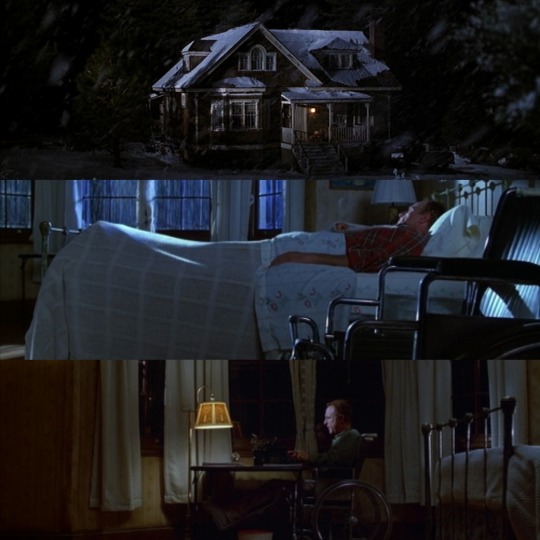
Misery (1990, Rob Reiner)
20/04/2024
#Misery#thriller#1990#rob reiner#stephen king#1987#psychopathy#annie wilkes#kathy bates#Academy Award for Best Actress#Golden Globe Award for Best Actress in a Motion Picture Drama#american film institute#2003#AFI's 100 Years 100 Heroes and Villains#colorado#sheriff#pain management#Serial killer#homicide#Suicide#Combustibility and flammability#cigarette#Andrew Scheinman#novel#Castle Rock Entertainment#william goldman#adze#William Hurt#academy awards#kevin kline
8 notes
·
View notes
Text
A historical hunger games simulator (and me)
Jimmy Carter kills everyone.

Already he’s killed three people.

Czolgosz and I are hunting together, Robespierre almost killed Bernie, Breckenridge being creepy
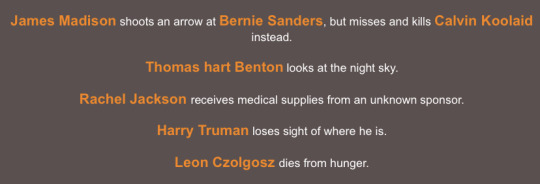
Dammit, Madison. Dammit Czolgosz. Also Coolidge auto corrected to Koolaid when I was making this…

Oh goodbye Hayne… also who is giving Breck a hatchet? OK Mary.

Carter kills another one. Weird as fuck alliances. Oh Clay.

Carter killed another one! And so does Jackson!
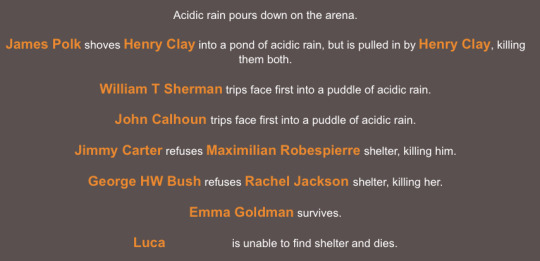
lots of people die. Including me.

What an anticlimactic death.

Honestly, she’s the best person to win this. I’m not mad.

Jim my Carter had six kills. SIX.
#Hunger games simulator#andrew jackson#james k polk#john c calhoun#henry clay#stephen douglas#maximilien robespierre#mary todd lincoln#abraham lincoln#william t sherman#jimmy carter#rachel jackson#robert hayne#thomas hart benton#leon czolgosz#emma goldman#charles sumner#james madison#bernie sanders#john c breckenridge#calvin coolidge#Koolaid#harry truman#george hw bush#and me lol
4 notes
·
View notes
Text
Casual Sex? – That’s the Name of the Movie, I’m not Asking
In the 1988 film "Casual Sex?" directed by Geneviève Robert, Stacy and Melissa navigate relationships and sexuality at a health spa, confronting the AIDS epidemic.
If you have never heard of the 1988, Geneviève Robert directed film “Casual Sex?” I promise you, it’s not what you’re thinking. When I was first introduced to this film by, my MOM, I was shook simply because of the title. I couldn’t imagine why my mom was not only attempting to get me to watch smut, but she wanted to watch it with me! Thankfully, that’s not what this movie is, though I’m sure…

View On WordPress
#Andrew Dice Clay#comedy#Film#Geneviève Robert#Judy Toll#Lea Thompson#Movie Review#Movies#Peter Dvorsky#Stephen Shellen#Valerie Breiman#Victoria Jackson#Wendy Goldman
1 note
·
View note
Text


dr. andrew goldman sonogram + lennart nilsson, 1965 in the molecular gaze: art in the genetic age - suzanne anker + dorothy nelkin (2004)
162 notes
·
View notes
Text
Films You Kind of Have to Watch During the Holidays Because They’re Technically Christmas Movies (No I Won’t Elaborate)
Sound of Music (1965) dir. Robert Wise
Quote: “After all, the wool from the black sheep is just as warm.”
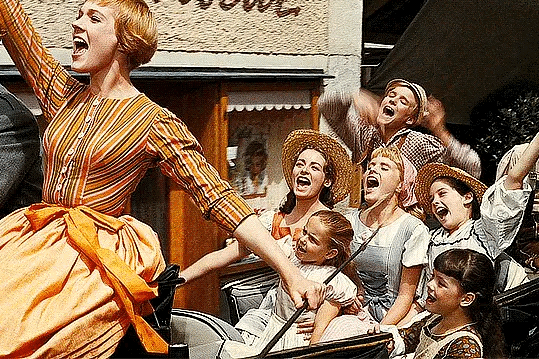
While You Were Sleeping (1995) dir. Jon Turteltaub
Quote: “I've had a really lousy Christmas, you've *just* managed to kill my New Year's, if you come back on Easter- you can burn down my apartment.”

Anastasia (1997) dir. Don Bluth & Gary Goldman
Quote: “There was a time, not very long ago, where we lived in an enchanted world of elegant palaces and grand parties.“

Barbie in the Nutcracker (2001) dir. Owen Hurley
Quote: “There's a world full of wonders out there, Uncle, and Clara deserves to experience them.”
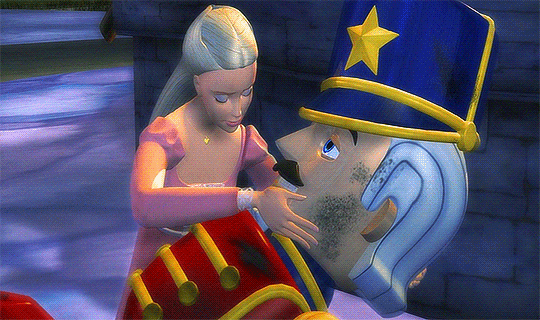
Harry Potter and the Sorcerer’s Stone (2001) dir. Chris Columbus
Quote: “Now if you two don't mind, I'm going to bed before either of you come up with another clever idea to get us killed - or worse, expelled.”

Mean Girls (2004) dir. Mark Waters
Quote: “Raise your hand if you have ever been personally victimized by Regina George.”
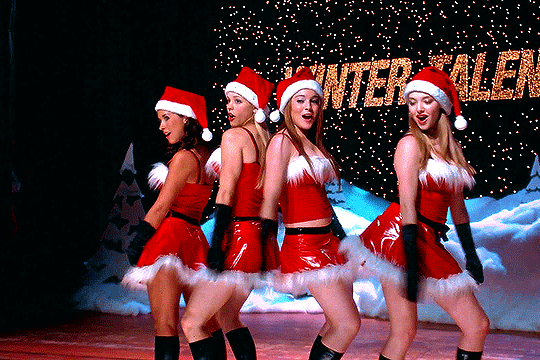
The Chronicles of Narnia: The Lion, The Witch and the Wardrobe (2005) dir. Andrew Adamson
Quote: “Once a king or queen of Narnia, always a king or queen of Narnia. May your wisdom grace us until the stars rain down from the heavens.”
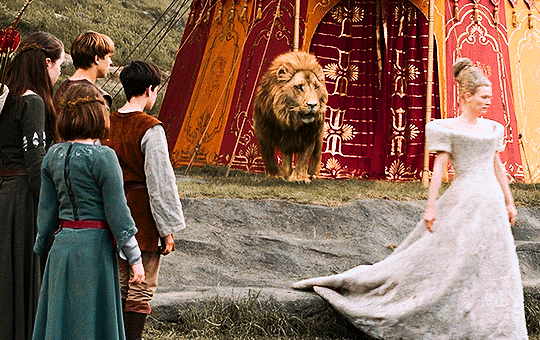
The Twilight Saga: Breaking Dawn Part 2 (2011) dir. Bill Condon
Quote: “My life as a human was over, but I've never felt more alive. I was born to be a vampire.”
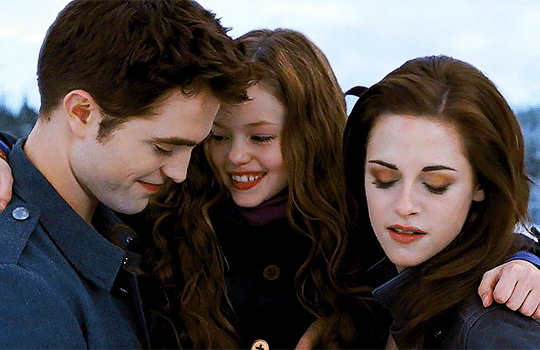
Little Woman (2019) dir. Greta Gerwig
Quote: “Just because my dreams are different than yours, it doesn’t mean they’re unimportant.”
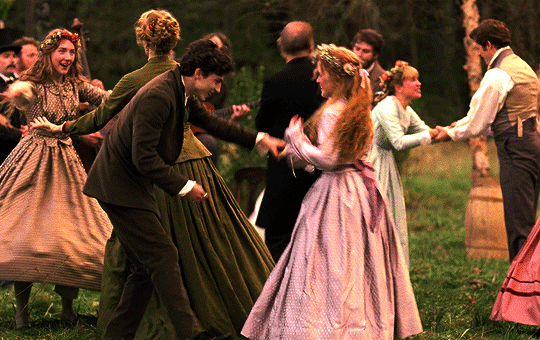
#these are all christmas movies#change my mind (you can’t)#sound of music#while you were sleeping#anastasia#barbie in the nutcracker#harry potter#harry potter and the sorcerer’s stone#mean girls#the chronicles of narnia#the lion the witch and the wardrobe#twilight#twilight saga#breaking dawn#breaking dawn part 2#little women#films#christmas films#holiday films#movie recommendation
71 notes
·
View notes
Note
Suggestions for fantasy books:
In Other Lands - Sarah Rees Brennan
Beauty - Robin McKinley
Uprooted - Naomi Novik
The Broken Earth (series) - N.K. Jemisin
The Princess Bride - William Goldman
The Deep - River Solomon
Poison - Chris Wooding
Inkeeper Chronicles (series) - Ilona Andrews
The Witcher (series) - Andrzej Sapkowski
The Poppy War (series) - R. F. Kuang
The Live Ship Traders (series) - Robin Hobb
Sorceror Royal (series) - Zen Cho
The New Moon's Arms - Nalo Hopkinson
The Curse Workers (series) - Holly Black
Alice (duology) & Lost Boy - Christina Henry
Ring Shout - P. Djèli Clark
Kingkiller Chronicle (series) - Patrick Rothfuss
Legends & Lattes - Travis Baldree
Iron Widow - Jay Zhao
Coraline - Neil Gaiman
Pet - Akwaeke Emezi
Thursday Next (series) - Jasper Fforde
A Monster Calls - Patrick Ness
The Bloody Chamber - Angela Carter
The Dark is Rising (series) - Susan Cooper
Wicked - Gregory Maguire
East - Edith Pattou
Knights of Liofwende (series) & The Welkin Weasels (series) - Garry Kilworth
Old Magic - Marianne Curley
Book of the Crow (series) - Catherine Fisher
Mongrels - Stephen Graham Jones
The Last Binding (series) - Freya Marske
Sorry, I know that's a lot! Anyway, thank you for running these polls and breaking my heart again and again, lol.
What a list! You've got a lot of great ones in here (I love you, Poppy War, Uprooted, and Iron Widow). I've added them all, though some of the names changed due to series vs book titles
#ask#submission#in other lands#beauty#uprooted#the broken earth#the princess bride#the deep#poison#innkeeper chronicles#the witcher#the poppy war#the liveship traders#sorcerer royal#the new moon's arms#curse workers#alice#lost boy#ring shout#the kingkiller chronicles#legends and lattes#iron widow#coraline#pet#thursday next#a monster calls#the bloody chamber#the dark is rising#wicked#east
34 notes
·
View notes
Text
very glad murdoch mysteries has gotten better about portraying shitty capitalists as just that, thank god for them portraying Thomas Edison as the pathetic asshole that he was, and for letting Emma Goldman punch Andrew Carnegie, very good very good
19 notes
·
View notes
Text
For @overnightheartbeats continued from here
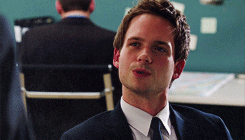
Andrew couldn't help the slight chuckle that left him at her retort. He'd always thought that sass of hers was amusing. "It would be odd if it were a social call coming from you, since you usually reserve those for my brother." he mused. Blue hues glanced down as she dropped the envelope on his desk. "The point is to probably maintain the Grey-Goldman alliance, clearly." he said with confidence as though it were obvious. Their parents had been friends since he was a kid. He reached out and grabbed the envelope holding it up slightly. "Tony get one of these?" he asked, unable to help his curiosity.
13 notes
·
View notes
Text
emma wip idk

i stole fun construction paper from my gifted class so I’m going to make it colorful
#I’m so jaded#at this point idec about the president I just wanna die#Anyway#GOLDMANPOSTING#anarchism history#andrew jackson bbq#my artwork#emma goldman#1900s#uss maine blown up
9 notes
·
View notes
Text
Andrew Perez and Asawin Suebsaeng at Rolling Stone:
Donald Trump’s inaugural committee is expected to raise the most cash in the history of such events — perhaps upward of $150 million, and certainly more than the record $107 million he raised for his first presidential inauguration. A good chunk of that cash is coming from companies that previously expressed dismay about the Jan. 6 insurrection at the U.S. Capitol that Trump instigated to try to avoid transferring power to President Joe Biden. As The Wall Street Journal reported Tuesday night, the Trump inaugural fund has received donations or pledges from at least 11 companies or lobbying groups that pledged to cut off or pause their political giving after Jan. 6. Though it is common for large companies to donate to Democratic and Republican inaugural committees — as somewhat implicit signals that they’re hoping for business-friendly behavior in the new presidential era — there is something extra explicit about the transactional desires during this season’s corporate attempts to shove cash into Trump-related coffers. Trump himself certainly sees it that way.
In the past few weeks, Trump has at times asked close allies about how much major corporations have donated to the inaugural committee, and has sometimes inquired about specific companies by name, a person with direct knowledge of the matter tells Rolling Stone. Earlier this month, when the president-elect asked about one big-name corporation and was told it hadn’t donated, Trump replied, “Well, they better do it soon then,” this source adds. This all comes at a time not just when corporate America is scrambling to secure influence in the revival of Trump’s Washington; it comes after Trump and senior members of his government-in-waiting and inner sanctum have openly threatened to use the vast powers of the federal government to retaliate against media properties, prominent companies, nonprofit groups, and others who Trump and co. deem as crossing him too much.
During this Biden-Trump presidential transition, a recent, sudden lawsuit settlement between ABC and Trump — to the tune of roughly $15 million — was widely viewed within ABC News as a “capitulation” by ABC and Disney to the incoming president, as well as the delivery of a large sum of please-don’t-hurt-me cash from a corporate parent that has a lot of business before the government.
[...]
Some of the top donors include: Amazon ($1 million); AT&T; Bank of America; Charter Communications ($1 million); Coinbase ($1 million); Ford ($1 million); General Motors; Goldman Sachs; Intuit ($1 million); Stanley Black & Decker ($1 million); Toyota ($1 million); and Uber ($1 million, plus another $1 million from its CEO). Meta, the parent company of Facebook, is giving $1 million. The powerful drug lobby Pharmaceutical Research and Manufacturers, or PhRMA, is kicking in $1 million, as is Sam Altman, the CEO of OpenAI.
Fascist shakedown artist Trump is intimidating businesses into donating to his 2nd inauguration in order to stay in his good graces.
See Also:
Raw Story: Trump 'keeping tabs' on which companies aren't shelling out inauguration cash: report
Daily Kos: ‘They better do it soon’: Trump shakes down companies for inauguration cash
2 notes
·
View notes
Text
There had always been those who naively believed that hellstone could, in some way, in some novel form, actually be tamed—could be brought under control, made safer or more convenient, be “domesticated,” as the case may be. And there have always been opponents to that idea. When Eleanor Greer invented the process that would later go on to be cemented as the standard process for refining hellstone for safe use and safe shipment, the President of the Mining Guild at the time, a man by the name of Arn Goldman, would, allegedly, tell anyone who would listen for more than a minute or two, that Greer was a fool for trying: “it’s no coincidence,” he is recorded as having said, “that hellstone’s the very same color as blood. Anyone who doesn’t take that as a sign is stupid enough to deserve what’s coming to ‘em.”
This week, on Ruin’s Gate: Nowhere to go but down.
GET YOUR "SAY OK TO THE CLOCK" SHIRT HERE: https://www.teepublic.com/user/the-unexplored-places
Support us on Patreon: https://www.patreon.com/unexploredcast Follow us on Tumblr: https://unexploredcast.tumblr.com/ Art by Ben Prevas Music by Andrew: https://andrewperricone.bandcamp.com/ Indigeneity Consultation by Wind: https://twitter.com/windjammah, https://qomrades.com/ Transcripts: https://unexploredcast.tumblr.com/transcripts
2 notes
·
View notes